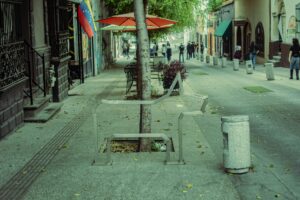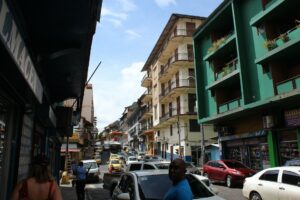
But towards the end of the bombardment, though still I durst not venture in the direction of the stockade, where the balls fell oftenest, I had begun, in a manner, to pluck up my heart again, and after a long detour to the east, crept down among the shore-side trees. (Treasure Island by Robert Louis Stevenson)
動画の後半部分でリスニング用音声が流れます。
英文を前から読んでいくために、語句のかたまりを作ります。こんな具合に課題文をスラッシュ(斜め線)で区切ります(スラッシュリーディング)。語句のかたまりを意識すると、リスニングで英語の意味をつかむのが楽になります。
But towards the end of the bombardment,/(接続詞の前)though still I durst not venture in the direction of the stockade,/(関係副詞の前)where the balls fell oftenest,/(コンマの後)I had begun, in a manner, to pluck up my heart again,/(接続詞の前)and after a long detour to the east,/(コンマの後)crept down among the shore-side trees.
語句のかたまりを前から訳していきます。
But towards the end of the bombardment,
しかし、砲撃が終わりに近づいたころ
though still I durst not venture in the direction of the stockade,
私は防御柵の方には依然として、あえて近寄ることはなかったとはいえ
where the balls fell oftenest,
大砲の着弾が最も激しかった
I had begun, in a manner, to pluck up my heart again,
私はある意味、再び勇気を奮い起こしはじめた
and after a long detour to the east,
そして、大きく迂回して東へ向かった後
crept down among the shore-side trees.
岸辺の木々の間を這うように進んだ
しかし、砲撃が終わりに近づいたころ、大砲の着弾が最も激しかった防御柵の方には依然として、あえて近寄ることはなかったとはいえ、私はある意味、再び勇気を奮い起こしはじめ、大きく迂回して東へ向かった後、岸辺の木々の間を這うように進んだ。
今回の課題文は修飾語句が多いため、訳しにくくなっています。修飾語句の見分け方をご紹介します(以下、[修]= 修飾語句)。
But towards the end of the bombardment, [修]前置詞 towards がある
though still I durst not venture in the direction of the stockade, [修]従位接続詞 though がある
where the balls fell oftenest, [修]関係副詞 where がある
in a manner, [修]前置詞 in がある
and after a long detour to the east, [修]前置詞 after がある
But towards the end of the bombardment, though still I durst not venture in the direction of the stockade, where the balls fell oftenest, I had begun, in a manner, to pluck up my heart again, and after a long detour to the east, crept down among the shore-side trees.
修飾語句ではない語句を抜き出すと→ I had begun to pluck up my heart again(and)crept down among the shore-side trees→ 私は再び勇気を奮い起こしはじめ、岸辺の木々の間を這うように進んだ
(この「骨格」をなす語句にさまざまな修飾語句がついて、描写をふくらませているわけです)








